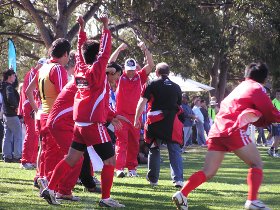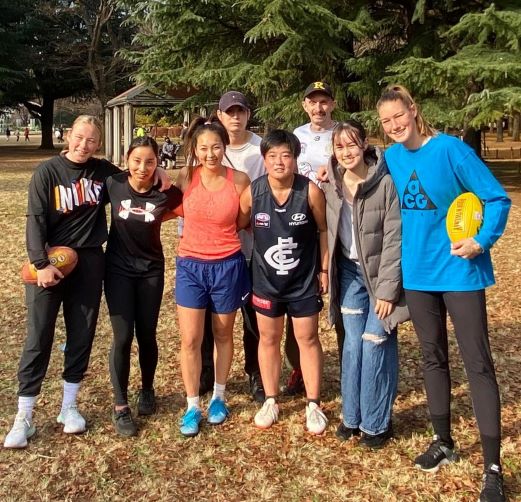AFL Japan Warriors - Land of the Rising Sherrin
- Wednesday, December 14 2022 @ 04:49 pm ACDT
- Contributed by: Jarrod Landells
- Views: 23,494

 In the wake of turbulent pandemic-induced isolation and geopolitical unease the topic of the cultural relationship between Japan and Australia remains an intriguing sub-issue that has arguably only scratched the surface of its potential, despite the now 70 years of formally re-established relations and centuries of informal ties.
In the wake of turbulent pandemic-induced isolation and geopolitical unease the topic of the cultural relationship between Japan and Australia remains an intriguing sub-issue that has arguably only scratched the surface of its potential, despite the now 70 years of formally re-established relations and centuries of informal ties.
While the mostly staid and rigidly defined roles of trade and military might have defined the prominent narrative of how countries act, it is the altogether unsophisticated yet labyrinthine expressions of society (food, art, sport) that really explain how we get along...or don’t. Some of them are a bit more interesting or unusual than others.
If you grow up in Japan, the yearly celebration of Undo-kai marks the peak of sporting camaraderie and effort. A public holiday greets millions of children each year – but there is no time for rest, instead tiny bodies scurry their way through relays, tugs-of-war and Kibasen, a traditional take on horseback combat, only the horse is three kids and the combat involves stealing headbands from other ‘riders’.
Despite the ubiquity of junior sport played out on a national scale with localised echoes each term, it is rare for non-professional athletes to continue past high school. Especially for sports lacking a professional presence.
The pandemic almost obliterated competitive prospects for the remainder.
Japan only loosened its strict protocols around tourists entering the country in June. Just a few months later, a small group of university students from Tokyo made the reverse trip to Melbourne. Their goal? To strengthen their frayed connections to Australian football. Sota Kobayashi was among them.
“I am the leader of the Japan Warriors and despite the problems caused by Covid-19, I am happy to have made it to Australia safely.
“This team is made up of players from Komazawa University and Senshu University...we are from different faculties, so we are all learning different things. Some of us are studying English, some are studying Economics, others Geography.”
All of them are also athletically talented young adults who play footy regularly in Tokyo and beyond through their universities. Sota learned plenty in his short time in the southern sporting capital.
“It was really a great experience, from watching the AFL, training with the local teams (St Albans and Box Hill North took turns in hosting the group), of course, but the tour of St Kilda was the best.
“I also spent time with St Kilda player Mitchito Owens, which was very memorable.”
18-year-old Owens, who was selected by the Saints in last year’s draft, is one of a handful of current AFL players who have Japanese heritage, including the Gold Coast Suns’ utility Alex Davies and Brisbane Lions’ AFLW youngster Luka Yoshida-Martin.
Indeed Davies’ goal and the resulting celebration of his grandfather – who had flown directly from Japan to watch him play – provided one of the feel-good moments of the year for AFL fans.
While Sota and his colleagues might not figure on the AFL’s next national draft night, the layers of potential benefits for players, leagues and cultural literacy is not lost on the AFL’s International Development Manager Simon Highfield.
“The Warriors tour to Melbourne is a fantastic experience for these young men and women to immerse themselves in Australian football. The privilege of getting to experience multiple AFL games at the MCG and Docklands, as well as intimate experiences at Moorabbin and Punt Road is equally matched by the community training sessions with Box Hill North and St Albans.
“I hope all of these experiences have served valuable lessons so they can contribute to the continued growth of the game in Japan. The AFL and AFL Asia are thrilled to assist in the trip, and we’re already looking forward to the Warriors coming back next year.”
As Highfield alluded to, the tour included female students who had taken to the football code – a positive sign for many reasons, as like in Australia, the momentum from within and without for women’s football (and sport in general) has faced significant barriers. AFL Japan launched their own women’s program – the Mirais – in 2019 with a goal of competing in the next International Cup alongside the men’s side. For Mirais manager Sakiko Murakami, there are other key goals just waiting to be kicked.
“Since the AFLW is more about inclusion and diversity, we, Mirais, try to create as many connections as possible. I think that’s one of the best features of the AFLW.
“I want to expand inclusion in Japan as well. Because of Japanese culture, just showing a rainbow flag can cause a problem. But Mirais can be like a big family in which everyone is able to enjoy sports safely - regardless of their gender or sexuality.”
Murakami’s Mirais may be just finding their feet, but the former swimmer with eight years experience playing scrum half in rugby and a plethora of other sports besides (mostly in men’s teams by necessity) has hit the ground running. She’s started a podcast, seen the playing group double and even entered into a partnership for social good with Japanese animal welfare group ‘Buddies’.
“I’m usually a PhD student majoring in fish behaviour. Even in that area, even now, I have been told ‘Women should get married’ or ‘Why are you here? Do you have a boyfriend?’
“I think that kind of attitude makes me even more motivated to help women to shine by ourselves. Maybe that’s why I love the AFLW too. I hope someday we could do Pride Round in Japan.”
The ‘usually’ part of Murakami’s studies is explained best in her own words.

Photo by Sakiko Murakami during a visit by Tayla Harris and Kodi Jacques.
“Last year, I was in the first year of my PhD. I was so motivated. But due to COVID, Mirais’ trainings stopped and my professor forced me to work more than I was capable of: checking undergraduate and masters theses, caring for foreign students and even maintaining the budget of our lab.
“Then I got really sick mentally: I was diagnosed depression and insomnia. Right now, I’m taking off school.
“What I want to emphasise is that through the worst days, the Mirais family was still there and supported me. Our former coach Bec told me just ‘showing up’ is ok.”
When Mirais training resumed, Murakami was encouraged by the coach and others allowing her the time and space to take part in any way that fit. Skills training a bridge too far? They could sure use a photographer!
“Those words really helped me, made me realise I have a really strong family.
“I think Mirais saved my life.”
Arguably the face of AFL Japan’s development, 39-year-old veteran Michito Sakaki is beyond pleased with the trip and its potential to build something even more special.
“I consider the Warriors' expedition to Melbourne to have been very significant.”
Sakaki, who spent a preseason at Essendon (which included a match against Sydney), a stint at the regional footy powerhouse Wodonga Raiders and selection in the national side consistently since 2002 represents the apex of Australian football skill and passion from Japan. He is something of a cult figure within the fandom of both countries and has made lasting impressions.
“The AFL is still a sporting league that is not well known in Japan.
“The Warriors are a team of students, and it will be beneficial to have these people who will support AFL Japan in the future as players and staff members to have experienced the AFL in Melbourne.
“With the support of so many people on this expedition [they will gain] skills that can be applied in many situations. I hope that the students will return home having experienced the wonderful AFL culture and grown a whole lot.”
As Tullamarine beckoned, Sota was effusive in his praise of the experience.
“Players and staff at the clubs have been very kind and Australians are all very friendly. I went to restaurants and supermarkets and didn't understand a few words...they were so polite to me. A lot of people, including Simon made this possible. I am very grateful to them.”
Despite the surely important impact of educational sporting cultural exchanges of this type, kindness and harmony can only get you so far on the footy field. When I asked Sota what was next on his agenda, he was straight to the point in shades of white-line fever familiar to many who have laced a boot.
“First of all we want to win the AFL Japan league...the competition will resume and there we will fight as opponents.”


 RSS news
RSS news Twitter
Twitter Facebook
Facebook